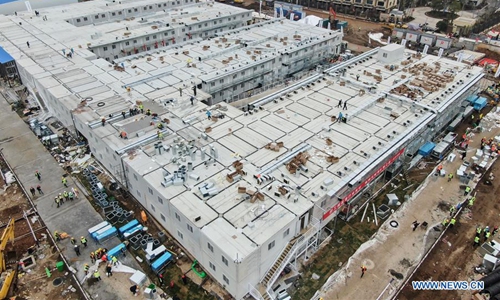HOME >> OPINION
Virus battle China's chance to show progress
By Wang Wenwen Source:Global Times Published: 2020/2/4 22:18:46

Aerial photo taken on Feb. 2, 2020 shows the Huoshenshan (Fire God Mountain) Hospital in Wuhan, central China's Hubei Province. China has built a makeshift hospital in 10 days to battle against the novel strain of coronavirus in Wuhan, the epicenter of the virus outbreak in central China's Hubei Province. Huoshenshan (Fire God Mountain) Hospital was delivered Sunday in Wuhan. It is dedicated to treating patients infected with the virus. (Xinhua/Cheng Min)
After the outbreak, some countries closed their borders to Chinese arrivals, including the US and Australia. China's neighbors, such as Russia, Mongolia and North Korea, have closed their borders with China to guard against the spread of the epidemic. Some have also reduced or even halted flights to and from China.
All these measures are understandable as these countries are obliged to ensure the safety of their own citizens, but at the same time, ill-intended moves are surfacing, such as some mainstream Western media's fueling of racist sentiment against the Chinese and smearing China's system and the nationwide efforts to fight the epidemic.
Many Chinese, including some overseas Chinese, are unhappy about certain countries' approach to the suffering that China is enduring. But such reactions should have been expected, and we should adopt a mild attitude. There is no reason to be too concerned with it.
During its development, China, a country with a population of 1.4 billion, is bound to experience various hardships including natural disaster and public health crisis.
Many developed countries, such as the US and Japan, have also undergone similar tests, especially those involving public health, in their development process. Japan enacted the Special Measures Act on New Influenza in 2012 that created an emergency system specifically for influenza. How China grapples with these crises is also a process that helps China improve its governance capabilities.
As China ascends as a major power, developing countries view China with both admiration and caution, while developed ones, especially those in the West, viewing it through critical lens.
Since China is gaining more influence during its rise, China should not expect praise from the West.
If China were to become a country accepted by the West, it has to be subject to the West ideologically, plus, its national strength cannot unnerve the Western countries. But this is not the path China has chosen. When China's economic strength gradually turns into political appeal at the global level, it can only firmly hold on to its chosen path.
As for the current public health emergency, suspicion and accusations will find no place once China defeats the deadly virus. After all, it is China's internal development that matters.
Indeed, loopholes have been exposed during the outbreak of the epidemic, including government responses to the emergency and information transparency, and China is taking the chance to improve governance while fighting the virus.
China cannot change how the world perceives it, but the world will view China's development and improvement by how it tackles each crisis.
RELATED ARTICLES:
Posted in: OBSERVER